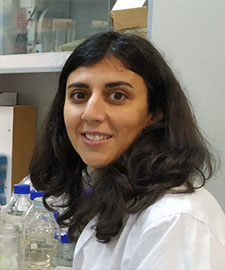e-mail: belen.gomez@cabimer.es
Main Research lines
- Transcription-associated genetic instability and R-loops
- Mechanisms preventing irreversible replication fork arrest
- Functions of histone deacetylases at DSB repair
e-mail: belen.gomez@cabimer.es
Main Research lines

Belén research’s career has centred on the contribution of replication, transcription a and DSB repair pathways to the maintenance of genetic stability.
Belén’s research on transcription as a major source of genetic instability revealed that the ubiquitous accumulation of co-transcriptional R-loops impairs replication fork progression genome-wide, thus making the S-phase checkpoint essential. Belén’s postdoctoral research in Clare Hall Laboratories (UK) and The Crick Institute to get further insight on the role of S-phase checkpoints in replication fork stabilization took advantage of combination of whole-genome sequencing technics with classic genetics to describe a role for histone deacetylation in the DNA damage sensitivity of checkpoint mutants. This research interest is currently followed in CABIMER to get further understanding in fork destabilization, collapse and repair, with a particular focus in histone deacetylases. In addition, in part through the development of powerful genetic tools for the detection of R-loops in vivo in yeast and humans, Belen has contributed to identify or characterize the role of several factors in the prevention or resolution of R-loops in eukaryotes (THO complex, Senataxin, DNA damage response, Post replicative repair, BRCA2, DDX5, DICER and others).
Since 2020, Belén is assistant professor at the Department of Genetics (University of Seville) and her research in CABIMER focuses on the causes and consequences of DNA damage arising during DNA replication, including R-loops and other sources of transcription-replication conflicts, as well as on the mechanisms of fork stabilization and DSB repair, with a special focus on the role of histone deacetylases.
ORCID: 0000-0003-1655-8407
ResearcherID: B-2365-2014
Scopus: 16678982400
Principal Investigator:
Research team:
Researcher:
Articles: